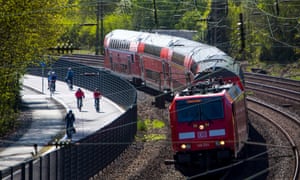Sinking water levels on Germany’s industrial rivers probably shaved at least 0.7 percentage point off economic growth last year, adding to a series of shocks that almost tipped the nation into a recession.
“German Air Travel Slump Points to Spread of Flight Shame”

Mounting concern about carbon emissions may be altering travel habits in Europe’s largest economy as figures from German airports show a steady decline in passengers taking domestic flights.
The number of people flying between German cities fell 12% in November from a year earlier, according to the ADV industry group, marking a fourth straight monthly drop and mirroring a pattern emerging in Sweden, where teenage activist Greta Thunberg has spearheaded a campaign against air transport. Rail firm Deutsche Bahn AG has meanwhile reported record passenger numbers.
“Germany’s First ‘Electric’ Highway Charges Trucks as They Drive”

Germany has opened the first stretch of a so-called electric highway that will connect hybrid trucks to overhead wires, allowing them to recharge while traveling on the country’s main transportation arteries.Yo
“Germany’s Dried-Up Rivers Cut Growth But the Rebound Is Coming”

“Germany’s Failed Climate Goals A Wake-Up Call for Governments Everywhere”

https://www.bloomberg.com/graphics/2018-germany-emissions/
Germany, the nation that did more than any other to unleash the modern renewable-energy industry, is likely to fall short of its goals for reducing harmful carbon-dioxide emissions even after spending over 500 billion euros ($580 billion) by 2025 to overhaul its energy system.
“How to Make Electricity in a Disused Coal Mine”

Germany’s decision to turn a coal mine into a pumped-hydro-storage station may solve two of the most intractable challenges created by its shift to clean power. On a local level, it provides new economic activity in a region where generations of workers have relied on fossil fuel for their livelihoods. On a regional level, it catalyzes the expansion of renewable energy by helping to maintain electric capacity even when the wind doesn’t blow or the sun doesn’t shine.
“Chinese, Germans Seek to Turn Chernobyl Wasteland to Solar Park”

Chinese and Germans are among dozens of investors taking Ukraine up on its offer to turn the grounds of one of the world’s worst nuclear disasters into a massive solar park.
Thirteen international investors are among the 39 groups seeking Ukraine permission to install about 2 gigawatts of solar panels inside the radioactive exclusion zone surrounding the defunct Chernobyl nuclear plant, according to Minister of Ecology and Natural Resources Ostap Semerak. Two gigawatts is almost the capacity of two modern nuclear reactors, although atomic power unlike solar works day and night.
“Rising German Coal Use Imperils European Emissions Deal”
The European Union’s attempt to cap greenhouse-gas emissions over the next 16 years is threatened again as rising pollution from the bloc’s biggest economies shows even developed nations want to burn cheap coal.
Germany, Europe’s largest economy, boosted consumption of the fuel by 13 percent in the past four years, while use in Britain, No. 3 in the region economically, rose 22 percent, statistics from oil company BP Plc show. While Germany pledged to cut heat-trapping gases 55 percent by 2030 from 1990 levels, it’s managed 25 percent so far and is moving in the wrong direction, according to the European Environment Agency.
The need for cheap energy is still a higher priority than the environment.
“Renewables Meet Record 27 Percent of German Electricity Demand”
Clean-energy sources such as solar and wind met a record 27 percent of demand in Germany in the first quarter
Germany, Europe’s biggest clean-energy market, seeks to increase the share of renewables to at least 80 percent by 2050 to replace atomic reactors shuttered by 2022.
Germany’s renewable energy performance is impressive, but its target is even more impressive.
“This Is What the Utility Death Spiral Looks Like”
http://www.greentechmedia.com/articles/read/this-is-what-the-utility-death-spiral-looks-like
In Germany, utility revenues are spiraling down the rabbit hole. Will American power companies follow?
The German mega-utility RWE provided another dismal reminder today of the painful transition European power companies are undergoing.
According to 2013 financial results, the utility lost more than $3.8 billion last year as it cycled down unprofitable fossil fuel plants due to sliding wholesale prices. The yearly loss is actually quite historic; it’s RWE’s first since 1949 when the German Republic was formed.
This follows poor earnings news from Vattenfall, a Swedish utility with the second-biggest generation portfolio in Germany, which saw $2.3 billion in losses in 2013 due to this same “fundamental structural change” in the electricity market.
The problem is well documented: high penetrations of renewables with legal priority over fossil fuels are driving down wholesale market prices — sometimes causing them to go negative — and quickly eroding the value of coal and natural gas plants. At the same time, Germany’s energy consumption continues to fall while renewable energy development rises.
RWE’s CEO Peter Terium called it “the worst structural crisis in the history of energy supply.”
Investors are not the only ones missing the renewable opportunity. European utility companies that have failed to change are also suffering and so are their investors.
Q: Why don’t British consumers switch to German energy providers?
A: If they do, they should switch to providers that have a mix of renewables and gas; to be sure that their supplier does not go bust!!!







Recent Comments